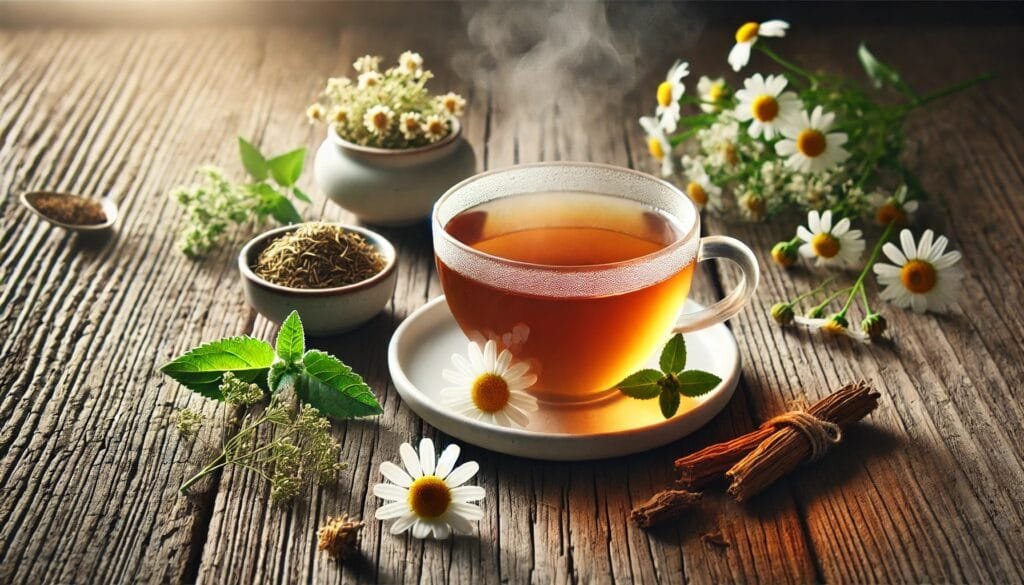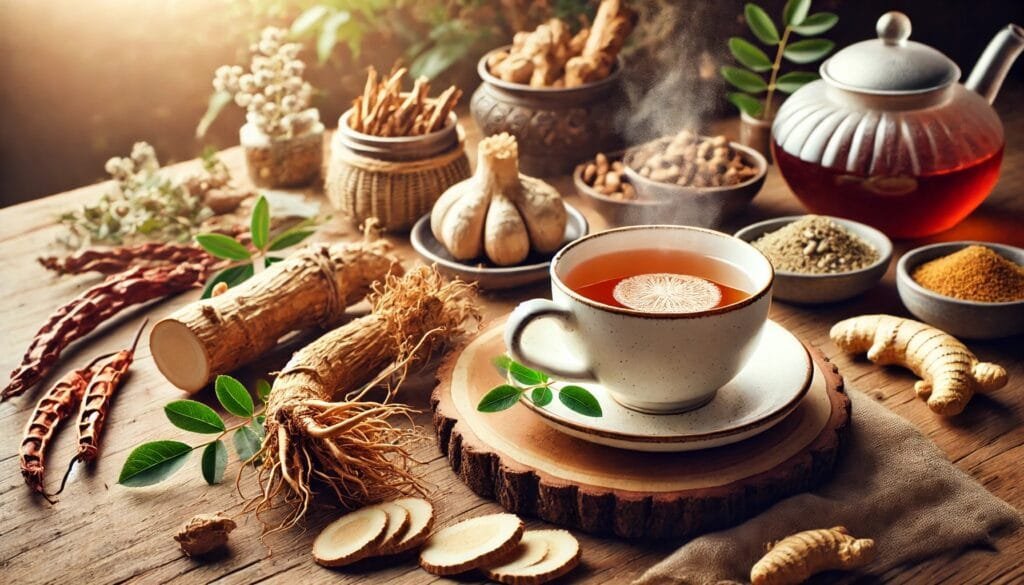Herbal tea blends offer a natural, effective approach to stress management through carefully selected combinations of adaptogenic and calming herbs. This comprehensive guide explores the science behind how specific herbs like chamomile, lemon balm, ashwagandha, and rhodiola work to lower cortisol levels and promote relaxation. You’ll discover expert-formulated DIY recipes with precise measurements, learn optimal brewing techniques, and understand how to integrate these remedies into a holistic stress-management routine. Whether you’re struggling with work-related stress, sleep disturbances, or general anxiety, these natural solutions provide a delicious and healthy alternative to pharmaceutical interventions, with centuries of traditional use now backed by modern scientific research. By following the evidence-based recommendations in this guide, you’ll be equipped to create personalized herbal tea blends that address your specific stress patterns while supporting overall mental and physical wellbeing.
Introduction
Stress has become a common factor in our daily lives. It starts with the ping of notifications, continues with back-to-back meetings, and adds more complexity with family responsibilities and the fast pace of the modern world. However, while some stress is positive, in that it can lead to growth, chronic stress can have very real, and very negative, effects on the body and mind.
What if I told you that relief could be as easy as drinking a cup of warm tea made from carefully selected herbs? For generations, healing systems from around the world have turned to plants for stress relief, long before the term ‘adaptogen’ became a wellness trend or we even knew the biochemical pathways of stress.
Today, we are able to combine the wisdom of generations with the knowledge of modern science to create potent herbal tea blends that can assist in helping to manage the stresses of daily life. These natural remedies are different from pharmaceuticals in that they work with your body, not against it, to help relieve stress.
In this guide, you will learn about the herbs that can help lower cortisol, the stress hormone, and how they can help you relax and support your nervous system when you most need it. You will discover which herbs are science-backed, how to use them together for best results, and how to work these healing drinks into your daily routine.
If you are looking for natural ways to cope with work stress, improve sleep, or just feel more relaxed, these DIY herbal tea blends may be exactly what you’ve been looking for. The best part is that you won’t need to be a herbalist to create effective formulations – I’ll share some easy, basic recipes that anyone can make at home.
So, with your favorite mug in hand, let’s dive into the world of stress-relieving herbal tea blends.
The Science Behind Herbal Stress Relief

“The oral microbiome is associated with HPA axis response
to a psychosocial stressor” by EleftheriaG. Charalambous, etc. licensed under CC BY 4.0
How Herbal Compounds Lower Cortisol
When stress comes in, the body has a set of things it does to cope, called the fight or flight response. At the center of this process is the secretion of cortisol, also referred to as the stress hormone, which aids the body during the stress response. However, chronic elevated cortisol levels are not without their consequences, they are known to cause weight gain, insomnia, digestive problems and even weaken the immune system.
Herbal tea blends, however, come in handy. Some of the stress relieving herbs used in the tea have metabolites that act directly on the stress response circuits of the body. For instance, research conducted and published in the Journal of Psychopharmacology established that some of the flavonoids present in chamomile act on the brain receptors in a manner similar to that of anti-anxiety drugs, but without the adverse effects that are associated with such drugs [1]. These natural compounds modulate the cortisol secretion level, in a way informing the body that it can now switch to the relax mode.
In the same manner, researchers from the University of Maryland Medical Center established that lemon balm contains rosmarinic acid which works to prevent the breakdown of the GABA transmitters (this is an inhibitory neurotransmitter that helps to calm nervous activity) [2]. When GABA levels are higher, it is easier for your mind and body to find its way to the state of calm.
The great thing about herbal solutions is that they can be used to treat all the symptoms of stress at the same time. Whereas pharmaceutical products act through the receptor or pathway, herbs are rich in substances that have a combined action on the nervous system, digestive tract, sleep cycle, and the overall resistance of the body.
Dr. Tieraona Low Dog, an integrative medicine physician, notes: “Plants are complex chemical machines that have been developing their chemical arsenal for millions of years. This complexity allows them to affect many biochemical pathways at once, an approach that is more comprehensive than that of single-molecule drugs.” [3]
The Role of Adaptogens in Promoting Relaxation
Whereas, chamomile is known to have calming effects and is used to relieve stress and anxiety, adaptogenic herbs are also very effective, only they act not right away, but over time and help to build up the person’s resistance. The term “adaptogen” was coined by Soviet scientist Dr. Nikolai Lazarev in 1947 to describe substances that help return the body to normal functioning during stress [4].
The way that adaptogens work was also quite interesting to me. Adaptogen herbs, according to a study released in the journal Pharmaceuticals, act on the hypothalamic-pituitary-adrenal (HPA) axis, the stress regulating part of the body, to ensure that the body’s stress response is appropriate for the stressors [5]. They don’t just make you drowsy or decrease all the stress responses (which may be necessary at times), adaptogens help to restore balance.
You can use adaptogens as your personal trainers for your stress response system. As with any form of exercise, stress is imposed on the muscles for a short period, but the body becomes stronger to deal with future stressors. Adaptogens are just the same; they are just mild forms of stress that help the body learn how to respond to stress in a better way in the future.
This adaptogenic effect can be seen especially with herbs such as ashwagandha. A double-blind randomized controlled trial was published in the Indian Journal of Psychological Medicine showed that the participants who took ashwagandha extract had their cortisol levels decreased by 28% over the placebo group [6]. Furthermore, they reported a significant enhancement in stress, anxiety and quality of life.
Dr. David Winston, a clinical herbalist and ethnobotanist, noted: “Regular drugs function through a specific receptor or pathway but adaptogens have their way of reregulating the body on multiple levels. This is because of the multiple target approach, which makes them useful in stress-related disorders that affect many body systems.” [15]
When we consume tea that is prepared with both calming herbs and adaptogens, we are taking a tea that can help with both the stress and the inability to cope with stress in the long run, which is a great approach to stress management while working with the body’s systems rather than against them.
Key Herbs for Stress Relief
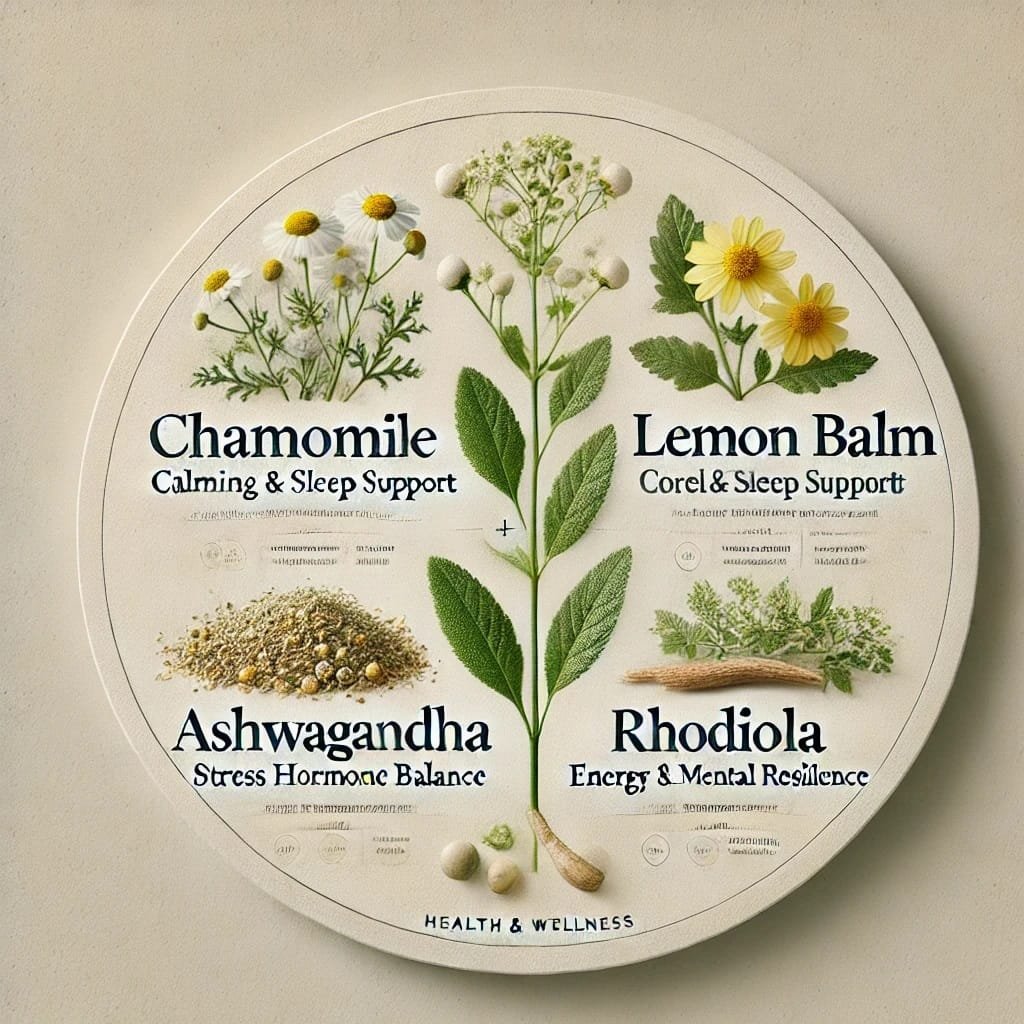
Chamomile and Lemon Balm
First of all, I would like to talk about two of the most popular and scientifically proven herbs that help to reduce stress: chamomile and lemon balm. These soft but powerful plants have been used for centuries to help people relax and to fight anxiety.
Chamomile (Matricaria recutita) is perhaps the most popular relaxing herb in the entire world. Its small white flowers have an apple like fragrance and contain apigenin a flavonoid which is able to attach to benzodiazepine receptors in the brain to induce relaxation without the side effects of other pharmaceutical products [7]. A controlled clinical trial which was performed and published in Phytomedicine showed that patients with mild to moderate generalized anxiety disorder who took chamomile extract had lower levels of anxiety compared to the placebo group [8].
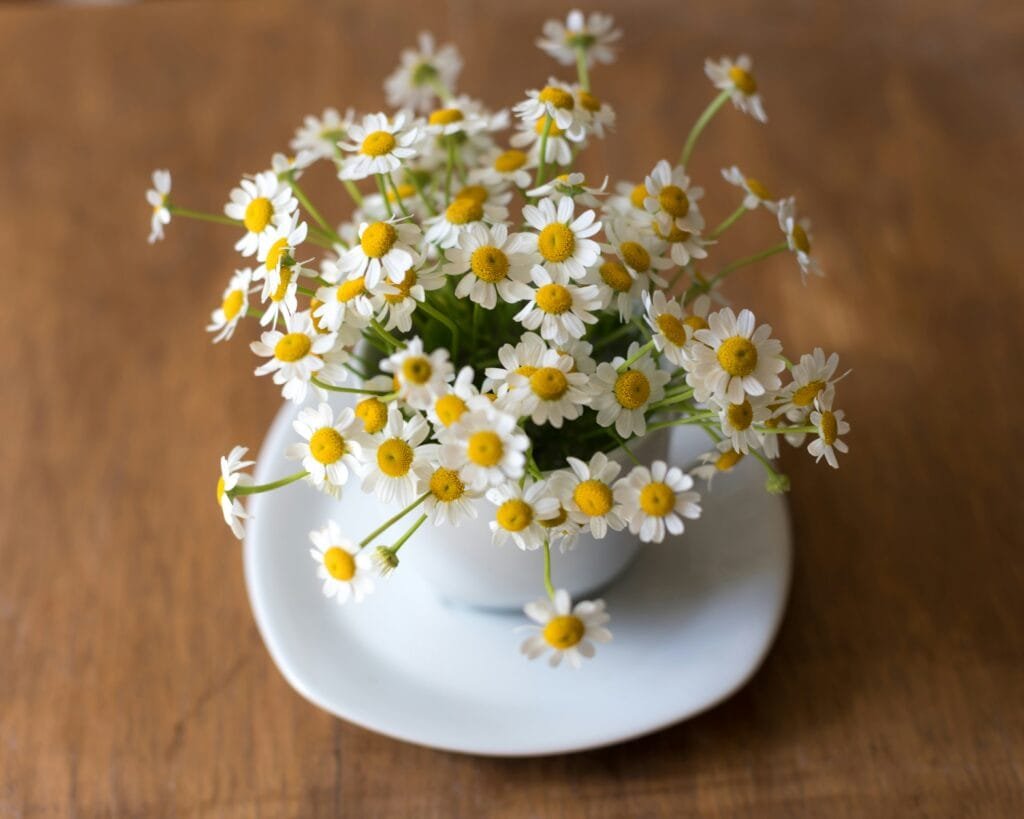
Chamomile has many other uses besides its anti-anxiety action:
- Natural and mild sleep aid that does not leave you drowsy.
- Helps with digestive issues which are a common manifestation of stress.
- Has very mild anti-inflammatory actions which may help to offset some of the physical consequences of stress.
Another important component of stress-relief formulations is lemon balm (Melissa officinalis), a herb with a pleasant citrus fragrance. Research has established that lemon balm has a GABAergic action through the inhibition of GABA transaminase, an enzyme that metabolizes this neurochemical [9]. A research which was done and published in the Nutrients journal revealed that the participants who took lemon balm had improved mood and cognitive function and reduced their level of stress [10].
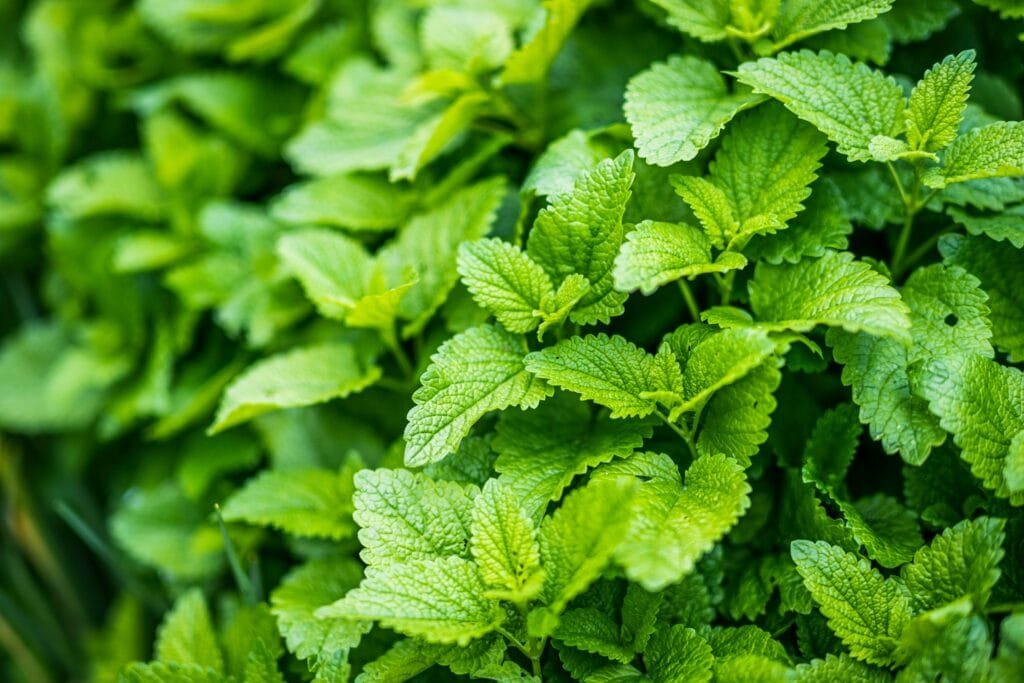
The magic of lemon balm does not end with the GABAergic effects:
- It has a pleasant lemon flavor that makes the stress-relief teas taste better.
- It has rosmarinic acid, which is a calmative and also an antioxidant.
- Traditional herbalists use it to ‘cheer up’ the nervous system, which is useful for stress-related low mood.
When chamomile and lemon balm are taken together, they produce a blend that acts on the different aspects of the stress response. The relaxing properties of chamomile combined with lemon balm’s mood enhancing benefits produce a soothing but non-drowsy formulation for use during the day.
Adaptogenic Herbs: Ashwagandha & Rhodiola
Chamomile and lemon balm provide instant relief while ashwagandha and rhodiola work on a different level and help the body to cope with the stress and become stronger in the long run.
Ashwagandha (Withania somnifera) is one of the leading adaptogenic herbs and is widely used in the Ayurvedic system of medicine for more than 3000 years. Modern science has also attested to the stress-reducing benefits of this mighty herb. A systematic review of 5 high-quality human trials in the Journal of Alternative and Complementary Medicine found that ashwagandha was consistent and significant in improving stress and anxiety in different populations [11].
What makes ashwagandha most valuable is its capacity to:
- Lower cortisol levels (by 28% in some studies)
- Supports healthy thyroid function (which is often suppressed by stress)
- Has non-addictive properties when used to promote restful sleep
- Improves physical endurance and helps in recovery from exercises.
- Reduces inflammation.
Ashwagandha has a rather strong and unpleasant taste, and therefore it is usually used in combination with other herbs in tea preparations. Though the taste is quite bitter and strong, the benefits of it are worth including it.
Rhodiola (Rhodiola rosea) is a plant that thrives in some of the worst conditions on earth, including high altitudes in the Arctic area. This resilience is mirrored in its effects in the human body. A study that was done in Phytotherapy Research revealed that taking rhodiola supplements helped lower self-reported anxiety, stress, anger, confusion and depression while enhancing mood in two weeks [12].
Rhodiola has some benefits that are different from other adaptogenic herbs and include:
- It has a stimulating effect which is helpful for stress that is associated with tiredness.
- Research has revealed that it can enhance the performance of the brain during stress.
- It assists in the return of the stress hormone levels to the normal range shortly after a stressor has been removed.
- Unlike some other calming herbs it improves alertness and does not cause drowsiness.
Dr. Andrew Weil, a leader in integrative medicine suggests rhodiola for “stress-induced fatigue and burnout,” situations and points out that it “helps prevent the depletion of catecholamines, which are important neurotransmitters that can be depleted during chronic stress.” [13]
When you use adaptogens like ashwagandha and rhodiola together with calming herbs like chamomile and lemon balm, you are using a holistic approach to stress management, for both the symptoms of stress and the ability to build stress tolerance.
DIY Herbal Tea Recipes for Stress Relief
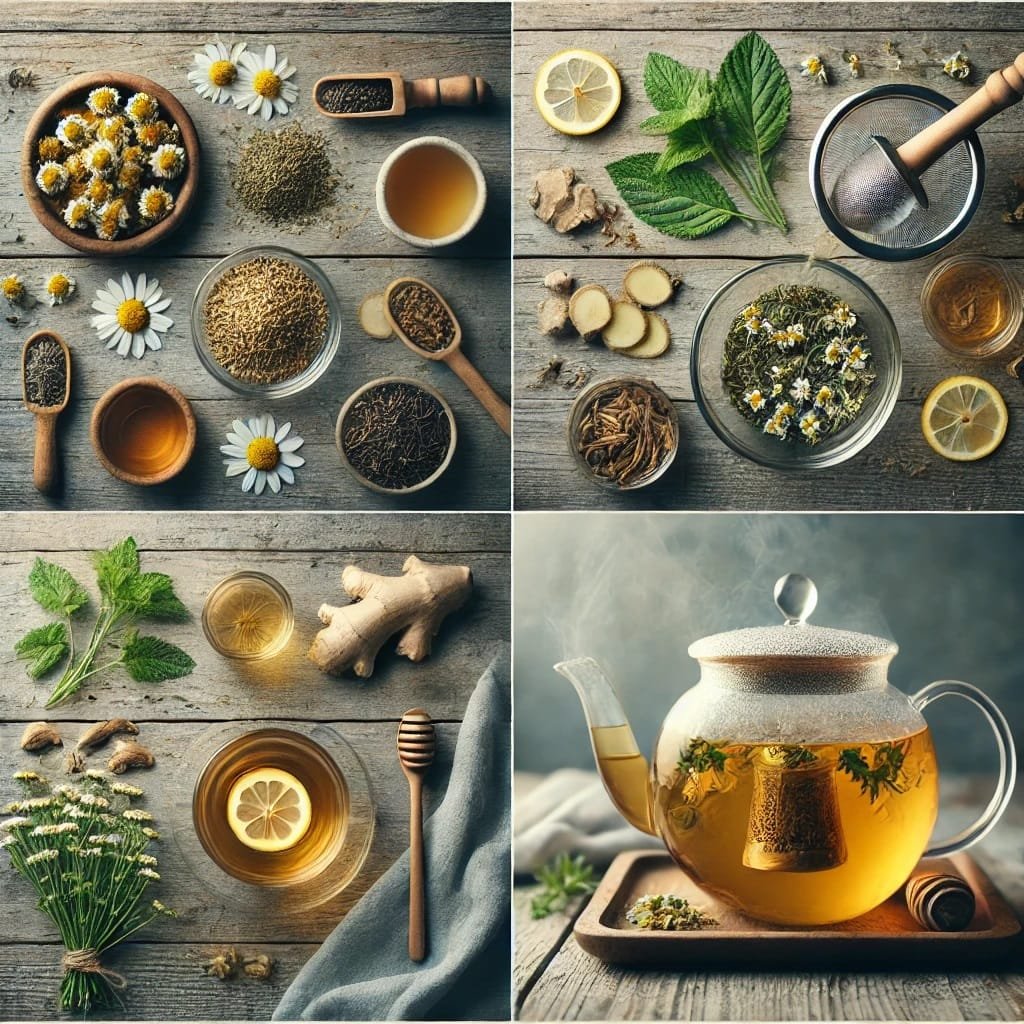
Recipe 1. Serene Chamomile and Lemon Balm Fusion
This soothing and delightful mixture is great, for unwinding in the evening or easing stress during the day while still staying attentive and focused. The blend offers relaxation benefits while also promoting digestive ease which is commonly impacted by stress.
Ingredients:
- 2 tablespoons dried chamomile flowers
- 2 tablespoons dried lemon balm
- 1 tablespoon dried lavender buds (optional, for enhanced relaxation)
- 1 teaspoon dried lemon peel (for flavor enhancement)
- 1/2 teaspoon dried rose petals (optional, for a touch of sweetness)
Preparation Method:
- Combine all herbs in a clean, dry bowl, gently mixing with your hands or a wooden spoon.
- Store in an airtight container away from direct sunlight and heat.
- To prepare: Use 1-2 teaspoons of the blend per cup of hot water (not boiling—around 190°F/88°C).
- Steep covered for 5-7 minutes, then strain.
- Add honey or lemon (optional), though the blend is naturally pleasant-tasting.
Suggested Applications:
- Have 1 to 1 cups, per day. Best taken around half an hour before facing stress or an hour before going to bed.
- You can enjoy this mixture regularly without any worries since the herbs are mild and non-addictive.
- To boost the experience further try focusing on your breath as you enjoy your tea. Breathing in the scents enhances the overall benefits, with an aromatherapy touch.
Herbalist Rosaleed de la Forêt mentions, “The volatile oils in these herbs do more than create a pleasant aroma—they’re therapeutically active compounds that begin working even as you inhale their scent while sipping your tea.” [14]
Recipe Number 2: Relaxing Tea Blend, with Adaptogens
This enhanced blend merges classic soothing herbs with adaptogens to offer instant relaxation and enduring stress management benefits making it perfect, for times of persistent stress when you require holistic assistance.
Ingredients:
- 1 tablespoon dried ashwagandha root
- 1 tablespoon dried rhodiola root
- 2 tablespoons dried chamomile flowers
- 1 tablespoon dried lemon balm
- 1 tablespoon dried holy basil (tulsi)
- 1 teaspoon dried ginger root (improves flavor and circulation)
- 1/2 teaspoon cardamom pods, crushed (enhances flavor and digestibility)
Preparation Method:
- Combine all herbs in a clean, dry bowl.
- Store in an airtight glass container protected from light and heat.
- For preparation: Because this blend contains roots that need more extraction time, use a decoction method:
- Place 1-2 tablespoons of blend in a small saucepan with 2 cups of water.
- Bring to a gentle simmer, then reduce heat to low and cover.
- Simmer for 15 minutes, then turn off heat and let steep for an additional 5 minutes.
- Strain and enjoy.
- The flavor will be stronger than the first blend, with earthy and slightly bitter notes. A small amount of honey and lemon can balance the flavor.
Suggested Usage:
- Drink a cup in the morning and another in the afternoon to help manage stress throughout the day.
- This mixture packs a punch! Begin with small doses and slowly ramp up as your body gets accustomed, to the adaptogens.
- Consistency plays a role when it comes to adaptogens. Their maximum benefits are typically seen after using them regularly for a few weeks.
- Remember to take a one week hiatus after using it for six weeks to avoid getting too used to it.
Clinical herbalist David Winston, RH(AHG), emphasizes: “Adaptogens aren’t quick fixes—they work gradually to restore balance to the body’s stress response systems. Patience and consistency are essential when working with these powerful plants.” [15]
Useful Tips for Brewing and Usage Guidelines
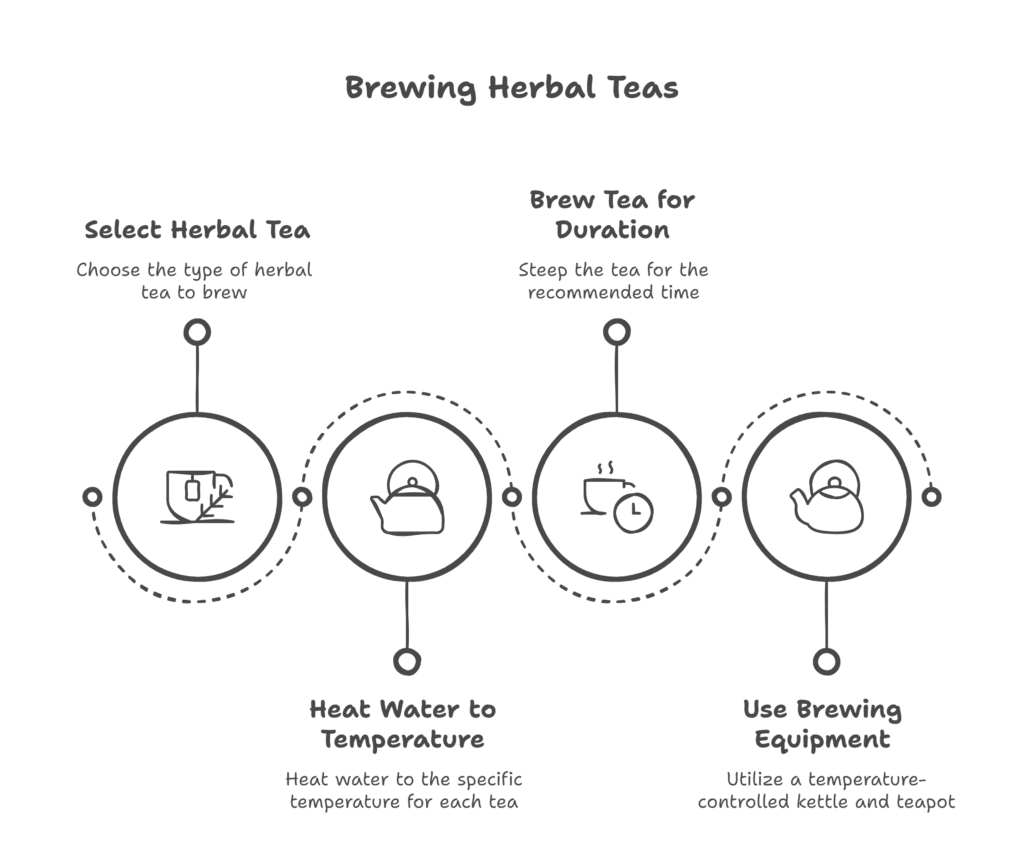
Top Tips, for Making Tea
The healing properties of your tea mix are not only determined by the herbs you choose but also by the way you brew them properly to extract the most beneficial compounds and create a delicious drink, with great taste.
The temperature of the water is important when extracting compounds, from various plant parts as different compounds are released at different temperatures.
- When making tea with flowers and leaves like chamomile and lemon balm it’s best to use water, around 190°F (88°C) instead of boiling water to preserve their delicate volatile oils.
- To extract the essence, from roots and bark like ashwangandha and rhodiola in tea preparation requires using hot water at boiling point (212°F / 100°C) for an extended period to achieve optimal extraction.
The strength of the brew is influenced by how you steep it.
- When making a blend of flowers and leaves let it infuse for 5 to 10 minutes with the cup covered to retain the oils in the mixture.
- Root-based blends necessitate an extraction process usually involving gentle simmer for around 15 to 20 minutes, with the pot covered.
Ensuring accuracy through measurements is key, to achieving optimal results.
- For leaf or flower teas add 1 to 1 1⁄4 teaspoons of herb blend, per cup of water.
- For root-based preparations it is recommended to use 1 to 3 tablespoons of the herb blend, per cup of ingredients utilized in the recipe.
- It’s best to measure herbs when they’re dry rather, than after they have soaked up water.
Recommendations for equipment:
- Steer clear of using aluminum pots as they could potentially interact with herbs and change their characteristics.
- Teapots made of glass stainless steel are perfect, for steeping healing herbal teas.
- You might want to think about getting a tea strainer with a mesh to stop tiny herb particles from getting into your drink.
Dr Aviva Romm MD suggests another method to maximize the benefits of herbal blends. “For blends containing both leafy herbs and roots, consider a hybrid approach. Simmer the roots first for 10 minutes, then turn off the heat, add the leafy herbs, and let steep for an additional 5-7 minutes.” [16]
The Best Ways to Savor Your Cup of Tea
Enjoying your tea at the right time and being mindful can greatly boost its ability to help reduce stress.
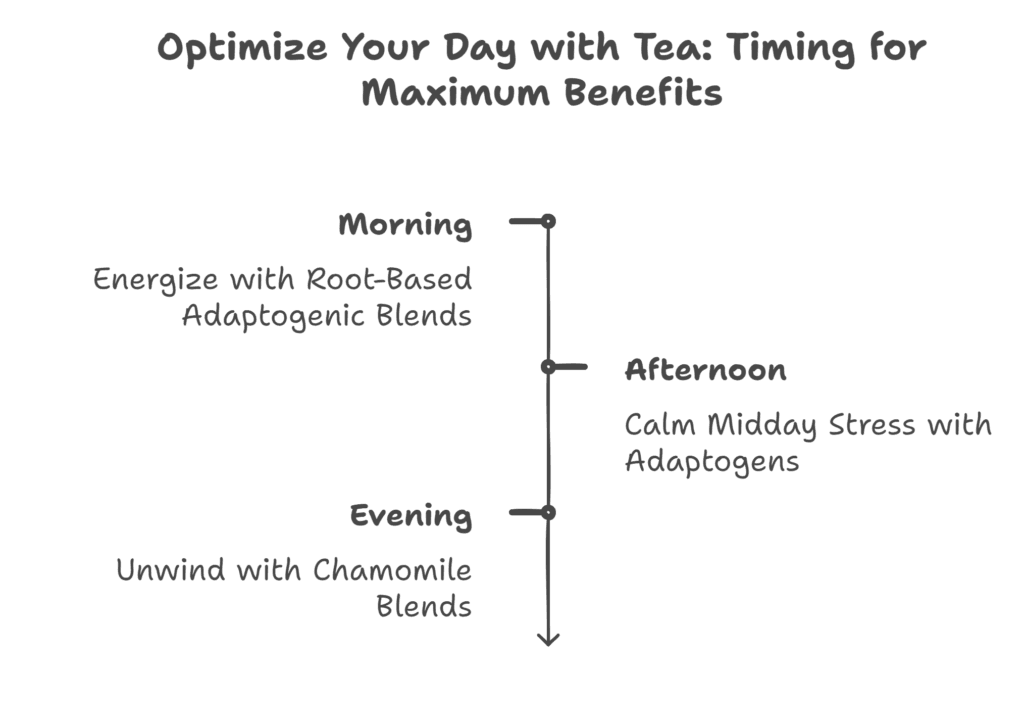
The Best Time for Maximum Benefits:
- In the morning time, for tea is when root-based adaptogenic blends shine best as they help boost energy and endurance all day sans the jitteriness caused by caffeine.
- In the afternoon taking a mix of adaptogens and gentle calming herbs may assist in easing the common mid-afternoon stress surge that many individuals encounter.
- Relaxing in the evening with Chamomile-based blends is ideal around 1 to 2 hours before bed. This helps signal your body to unwind and relax.
Establishing an Easing Stress Routine: Engaging in the calming ritual of brewing and enjoying tea can transform into an act of mindfulness that enhances the properties of the herbs.
- Before your water heats up take a moment to think about what you want to achieve.
- Take a moment to notice the hues and scents of the dried herbs, around you.
- Carefully observe as you pour the water and witness the herbs releasing their colors and delightful aromas.
- Get settled in a spot as you wait for your tea to brew.
- Before you take your sip pause to savor the fragrant aroma of the tea.
- Take your time. Savor each sip while appreciating the different flavors and comforting warmth of the drink.
Complementary methods are recommended by herbalist and naturopathic practitioner Mary Bove, “Pair your tea routine with a few minutes of deep breathing or a short meditation. This combination creates a synergistic effect, enhancing both the physiological and psychological aspects of stress relief.” [17]
Tips, for Storing to Maintain Potency;
- Remember to keep your dried herb mixes in sealed glass jars away from heat and dampness to maintain their freshness and flavor for longer periods.
- When stored correctly, most mixed dried herbs can retain their strength for approximately 6 to 12 months.
- Brewed tea can stay fresh in a glass jar in the fridge for as long as 48 hours which is handy when preparing bigger quantities of root decoctions that take longer to make.
Commonly Asked Questions
In closing it’s time to take action. Let’s make a difference.
In our exploration of tea blends for stress relief in the world of natural remedies lies a blend of ancient insights and contemporary scientific knowledge. From the instant soothing properties of chamomile and lemon balm to the enduring strength bestowed by adaptogens such as ashwagandha and rhodiola, nature presents a vast array of solutions for coping with the everyday pressures of modern existence.
The reason these herbal methods are so beneficial is not only because they work well but because they are gentle on the body. Unlike a lot of prescription medications that can be harsh on the system, carefully crafted herbal teas work in harmony with your body’s functions resulting in long-lasting stress relief without worrying about any unwanted reactions.
Keep in mind that using stress relief is most effective when incorporated into a comprehensive approach to well-being. Even the strongest tea combinations won’t make much of a difference if you’re constantly getting four hours of sleep each night or dealing with unresolved sources of ongoing stress. Think of these remedies as aids, in your overall health plan rather than expecting them to work miracles.
Feel free to test out the recipes provided in this manual and see for yourself the advantages they offer firsthand! You could begin by trying the Chamomile Lemon Balm blend if you’re not familiar with herbal teas or explore the elaborate Adaptogenic Stress Relief concoction if you’re dealing with continuous difficulties.
Looking to enhance your stress management skills? Here are three ways to keep progressing in your journey.
- Check out our adaptogens guide: Adaptogens & Brain Health to delve deeper into the incredible ways in which Cognitive teas can revolutionize how you handle focus and energy in your life.
- Join our group by signing up for our newsletter to access unique recipes and stay updated on the newest research discoveries and insightful interviews about natural methods, for coping with stress.
- Feel free to drop a comment sharing your pick for herbal tea that helps with stress. Your thoughts could be beneficial to others looking to improve their well-being.
Let’s cheer the discovery of stress relief by enjoying a soothing cup of tea now and then.
Ready to boost your brain health naturally?
Subscribe to our newsletter for updates on new blog posts, news, reviews, and guides.
Join Our Newsletter
Receive updates on new blog posts, news, reviews, and guides
Sources
- Srivastava, J. K., Shankar, E., & Gupta, S. (2010). Chamomile: A herbal medicine of the past with bright future. Molecular Medicine Reports, 3(6), 895-901. https://doi.org/10.3892/mmr.2010.377
- Kennedy, D. O., Little, W., & Scholey, A. B. (2004). Attenuation of laboratory-induced stress in humans after acute administration of Melissa officinalis (Lemon Balm). Psychosomatic Medicine, 66(4), 607-613. https://doi.org/10.1097/01.psy.0000132877.72833.71
- Low Dog, T. (2017). Fortify Your Life: Your Guide to Vitamins, Minerals, and More. National Geographic Books. https://www.amazon.com/Fortify-Your-Life-Vitamins-Minerals/dp/1426216688
- Panossian, A., & Wikman, G. (2010). Effects of Adaptogens on the Central Nervous System and the Molecular Mechanisms Associated with Their Stress—Protective Activity. Pharmaceuticals, 3(1), 188-224. https://doi.org/10.3390/ph3010188
- Panossian, A. (2017). Understanding adaptogenic activity: specificity of the pharmacological action of adaptogens and other phytochemicals. Annals of the New York Academy of Sciences, 1401(1), 49-64. https://doi.org/10.1111/nyas.13399
- Chandrasekhar, K., Kapoor, J., & Anishetty, S. (2012). A prospective, randomized double-blind, placebo-controlled study of safety and efficacy of a high-concentration full-spectrum extract of ashwagandha root in reducing stress and anxiety in adults. Indian Journal of Psychological Medicine, 34(3), 255-262. https://doi.org/10.4103/0253-7176.106022
- Amsterdam, J. D., Li, Y., Soeller, I., Rockwell, K., Mao, J. J., & Shults, J. (2009). A randomized, double-blind, placebo-controlled trial of oral Matricaria recutita (chamomile) extract therapy for generalized anxiety disorder. Journal of Clinical Psychopharmacology, 29(4), 378-382. https://doi.org/10.1097/JCP.0b013e3181ac935c
- Keefe, J. R., Mao, J. J., Soeller, I., Li, Q. S., & Amsterdam, J. D. (2016). Short-term open-label chamomile (Matricaria chamomilla L.) therapy of moderate to severe generalized anxiety disorder. Phytomedicine, 23(14), 1699-1705. https://doi.org/10.1016/j.phymed.2016.10.013
- Awad, R., Muhammad, A., Durst, T., Trudeau, V. L., & Arnason, J. T. (2009). Bioassay-guided fractionation of lemon balm (Melissa officinalis L.) using an in vitro measure of GABA transaminase activity. Phytotherapy Research, 23(8), 1075-1081. https://doi.org/10.1002/ptr.2712
- Kennedy, D. O., Scholey, A. B., Tildesley, N. T., Perry, E. K., & Wesnes, K. A. (2002). Modulation of mood and cognitive performance following acute administration of Melissa officinalis (lemon balm). Pharmacology Biochemistry and Behavior, 72(4), 953-964. https://doi.org/10.1016/S0091-3057(02)00777-3
- Pratte, M. A., Nanavati, K. B., Young, V., & Morley, C. P. (2014). An alternative treatment for anxiety: a systematic review of human trial results reported for the Ayurvedic herb ashwagandha (Withania somnifera). Journal of Alternative and Complementary Medicine, 20(12), 901-908. https://doi.org/10.1089/acm.2014.0177
- Cropley, M., Banks, A. P., & Boyle, J. (2015). The Effects of Rhodiola rosea L. Extract on Anxiety, Stress, Cognition and Other Mood Symptoms. Phytotherapy Research, 29(12), 1934-1939. https://doi.org/10.1002/ptr.5486
- Weil, A. (2018). Mind Over Meds: Know When Drugs Are Necessary, When Alternatives Are Better – and When to Let Your Body Heal on Its Own. Little, Brown Spark. https://www.amazon.com/Mind-Over-Meds-Alternatives-Better/dp/0316352969
- de la Forêt, R. (2017). Alchemy of Herbs: Transform Everyday Ingredients into Foods and Remedies That Heal. Hay House. https://www.amazon.com/Alchemy-Herbs-Transform-Everyday-Ingredients/dp/140195006X
- Winston, D., & Maimes, S. (2019). Adaptogens: Herbs for Strength, Stamina, and Stress Relief. Healing Arts Press. https://www.amazon.com/Adaptogens-Herbs-Strength-Stamina-Stress/dp/1594774900
- Romm, A. (2017). Botanical Medicine for Women’s Health (2nd Ed.). Churchill Livingstone. https://www.elsevier.com/books/botanical-medicine-for-womens-health/romm/978-0-7020-6193-6
- Bove, M. (2015). An Encyclopedia of Natural Healing for Children and Infants. McGraw-Hill Education. https://www.amazon.com/Encyclopedia-Natural-Healing-Children-Infants/dp/0658007254
- Sarris, J., Byrne, G. J., Cribb, L., Oliver, G., Murphy, J., Macdonald, P., Nazareth, S., Karamacoska, D., Galea, S., Short, A., Ee, C., Birling, Y., Menon, R., & Ng, C. H. (2019). L-theanine in the adjunctive treatment of generalized anxiety disorder: A double-blind, randomised, placebo-controlled trial. Journal of Psychiatric Research, 110, 31-37. https://doi.org/10.1016/j.jpsychires.2018.12.014
- Panossian, A., & Wikman, G. (2010). Effects of Adaptogens on the Central Nervous System and the Molecular Mechanisms Associated with Their Stress-Protective Activity. Pharmaceuticals, 3(1), 188-224. https://www.mdpi.com/1424-8247/3/1/188
- Teschke, R., & Eickhoff, A. (2015). Herbal hepatotoxicity in traditional and modern medicine: actual key issues and new encouraging steps. Frontiers in Pharmacology, 6, 72. https://www.frontiersin.org/articles/10.3389/fphar.2015.00072/full

